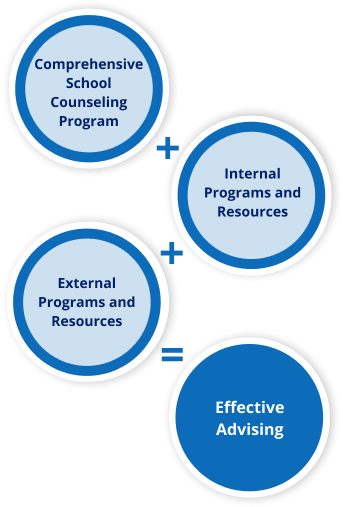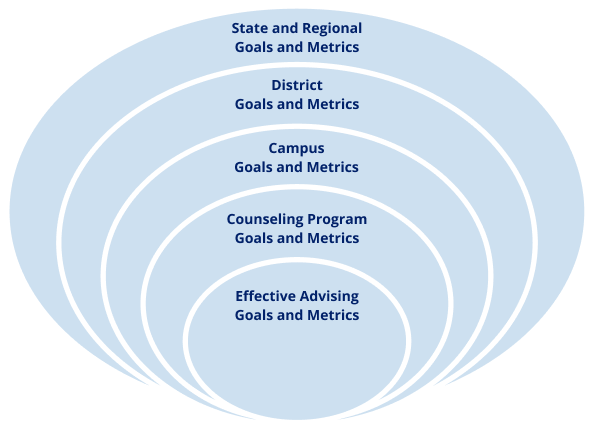Integrating Effective Advising
Collaboration among various college, career, and military programs and partners is essential in ensuring advising systems are successfully planned and implemented. A guiding principle of the Effective Advising Framework is that districts and open enrollment charter schools should integrate existing internal and external college, career, and military programs, curriculum, and resources before adding anything new.
Effective advising should be planned and evaluated at the district level through the comprehensive school counseling program, implemented and led through the school counseling team. Collaboration is encouraged among K-12, postsecondary institutions, workforce, and community stakeholders to better align advising practices and support students through their career and education pathway.


Measuring Success in Effective Advising
School counseling program leaders integrating effective advising services should track metrics aligned to district and campus goals. These include measurable student outcomes as well as stakeholder satisfaction with the program. Districts should align effective advising goals to ensure students are graduating to meet statewide college, career, and military readiness (CCMR) goals for accountability. In addition, advising goals should align to statewide workforce and higher education goals set by the tri-agency initiatives.

Effective Advising System Overview
Effective advising begins in elementary school and continues through middle school, high school, and into postsecondary career and education pathways. In a K-12 setting, effective advising is delivered through the individual student planning system of a comprehensive school counseling program. The foundation of effective advising is supporting students’ individual career and academic planning throughout their development. Internal and external partners coordinate services within effective advising to expand beyond an annual planning meeting between a student and school counselor. Effective advising systems emphasize integration rather than addition by aligning individual student academic and career planning within the districts. Effective advising ensures all services provided to students are safe, fair, and equitable.
Effective advising goals ensure students meet statewide college, career, and military readiness (CCMR) goals for accountability. In addition, advising goals align to statewide workforce and higher education goals set by the tri-agency initiatives. District and campus goals include measurable student outcomes as well as the level of stakeholder satisfaction.
Effective School Counseling Program Staff
The effective school counseling program staff includes school counselors and advisors who prioritize individual relationships and family engagement and are available to help navigate multiple sources of information and experiences to support informed decision making. Effective school counseling program staff use developmentally appropriate strategies and activities to discuss career aspirations and engage in academic and career planning with students.
They understand and support the student’s career and academic plan, acknowledging that the individual plan may change during the process of a student’s academic and career development. Effective school counseling program staff should be well-trained and expected to provide unbiased support to all students to facilitate safe, fair, and equitable academic and career development.
They should be trained on the fundamentals of effective advising and understand their role in the implementation of the individual planning system within the overall comprehensive school counseling program.
While it is unrealistic to expect school counseling program staff to implement all components of academic and career planning, effective program staff will be well-connected to additional supports and resources. They will collaborate with internal and external partners to fill gaps in knowledge and services so that all students are equipped with the support needed to make informed decisions.
Benefits of Implementation
Successful implementation of an effective advising program is a high-leverage opportunity for districts since the passage of House Bill 3, 86th Texas Legislature. New school finance structures enable districts to secure bonus funds by demonstrating their ability to prepare students for the future.
At least 55% of these funds must be spent to improve CCMR for grades 8-12. One category of allowable use of funds includes support for college and career advising. Bonus funds can and should be leveraged to sustain and continuously improve the district’s effective advising program. Below are projected benefits of the EAF for multiple stakeholders:

At the heart of the Effective Advising Framework is the belief that the best way to provide effective advising is through the individual student planning system of the school district’s comprehensive school counseling program. State statute tasks school counselors with the responsiblity for helping students reach their full academic, career, personal and social potential. The comprehensive counseling program encourages a whole child approach to postsecondary advising, taking into account each student’s unique academic, career, and emotional needs. With strong leadership, the school counseling program will prioritize college and career readiness and help every student create their own individual career and academic plan.
To ensure success, effective advising services should be regularly evaluated and improved through the district’s annual evaluation of the comprehensive school counseling program. School counseling leaders should make sure advising goals are included in the district’s goals and allocate sufficient resources for effective advising training and service delivery.
One of the core beliefs of the framework is that effective advising should connect a student’s future aspirations to their academic journey. This is achieved by utilizing the district’s career and technical education programs, which offer multiple entry and exit points. Effective advising helps students understand the 14 Texas Career Clusters, career pathways within those clusters, and high school programs of study that lead to high-growth, high-demand occupations. Effective advisors should be knowledgeable about the district’s program of study and certification offerings so they can guide students in the right direction. They should also be trained in using labor market information as a tool for career decision making and be familiar with work-based learning opportunities in high-demand industries. By doing so, they can help students make informed decisions about their futures and set them on a path to success.
Effective advising should be combined with work-based learning experiences to enhance career development. These experiences, focused on high-growth, high-demand industries, give students a chance to explore exciting career options and gain insight into the job market. Effective advising systems should use work-based learning as a tool to have meaningful conversations with students and help them make connections between their experiences and postsecondary plans. This way, students can make informed decisions about their futures and be on their way to success.
Effective advising should benefit from community and regional partnerships to enhance program guidance and service delivery. These partners, such as regional workforce boards, colleges, community organizations, and others, can bring college, career, and military resources and local programs to the table. Some community organizations may even offer direct advising services to students, supplementing the work of school counselors and advisors. However, it’s important to ensure these partners are properly trained and aligned with the district’s comprehensive school counseling program goals.
